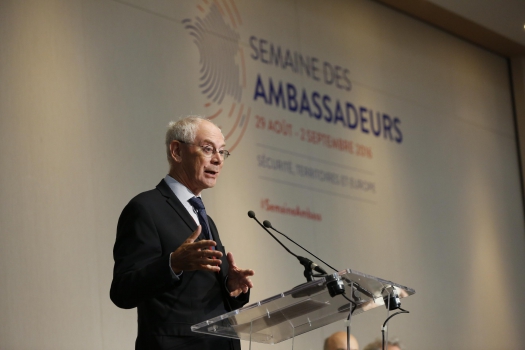Mission EUFOR Tchad RCA: General Pat Nash commanding the operation explains…
(BRUSSELS2) “A complex mission, in a difficult environment, with a volatile security situation, hostile climatic terrain and a huge logistical challenge”, here is in a few words how General Pat Nash described, to journalists, the European Union's military mission in Chad and the Central African Republic, of which he is the commander. Officially launched by the Council on January 28 (read: The mission in Chad launched on January 2?8. The strengths of member states), It is "the most important mission ever deployed by the EU".
"I was struck then in recognitions", explained the general, by the “Extenses of sometimes uninhabited areas, the poverty of the countries in which we will have to work”. The nearly 4000 EUFOR soldiers will in fact be deployed in an area 400 km wide and 800 km long, where the "paved roads are almost non-existent", and large distances. Almost 800 km separate "Abéché, headquarters of the force, and N'Djamena, the capital and headquarters for logistics", or several days by car. The logistical challenge is not small, as the general says. "For three months, we have been working to improve the infrastructure. Abéché airport has thus seen significant improvements." The smallest grain of sand can sometimes be a problem. “One of our contractors lacked cement to redo the airport runways. And there were none available. So we had to bring some from Europe”.
NEUTRALITY OF EUFOR
In a troubled situation between Chad, Sudan and their respective rebels, the " neutrality " and " independence of EUFOR is a key element, insists General Nash. Thereby " the EUFOR camps will be quite distinct from those of the French", already present within the framework of the bilateral cooperation operation " Epervier ". But do without the help of the " France, already present and which has the knowledge, contracts and resources, would have been unexpected and unusual ". An agreement has also been finalized with this country to " this provision of services ».
General Nash was, however, very clear in the face of possible attacks by armed forces, rebels or not. " My responsibility is that our forces are not mistakenly attacked by other ". What if the rebels attack? " If they shoot, we'll hit back ". More generally, if rebel action interferes with the mission of EUFOR (protect civilians, refugees and displaced persons, secure the area, facilitate humanitarian aid), we will react. (In contrast), if their action does not interfere, it does not concern us ". Important clarification for Pat Nash: “ EUFOR is not deployed along the border (with Sudan). And we have no intention of exceeding it ».
The deployment of troops should occur within 4 to 6 weeks, beginning of March, and will be concentrated first in Abéché, before heading north. Full capacity is expected to be reached by mid-May(also read: The Eufor Tchad operation reaches its initial operational capacity), "precursors" deployed these days: French, Austrians, Irish, Swedes, Finns, Belgians... as well as the Italians (field hospital). The Dutch and Romanians will follow, with the Poles bringing up the rear. The Swedes are only expected to stay for six months. “Each country has set different conditions” recognizes Nash. "But everything has been taken into account in the planning". A first assessment of the operation will, in any case, be made "in six months".
On the "overall cost of the mission", the general declined to comment: “It would make no sense and would be useless”. Some common costs are "assumed by the EU, for the headquarters for example. (...) For troops (delivery, etc.), it is up to each contributing country to assume it ". The common budget for the operation is made up of 119,6 million euros (+20 million compared to the initial decision), borne by each Member State, in proportion to their GDP, according to the mechanism known as "Athena" . On the other hand, the cost for each State is more difficult to assess: 260 million euros at the very least for France, according to our information, and 16 million for Poland… Read also: The common budget of the EUFOR Chad operation. Breakdown by state
(published in Europolitique, April 2008)

